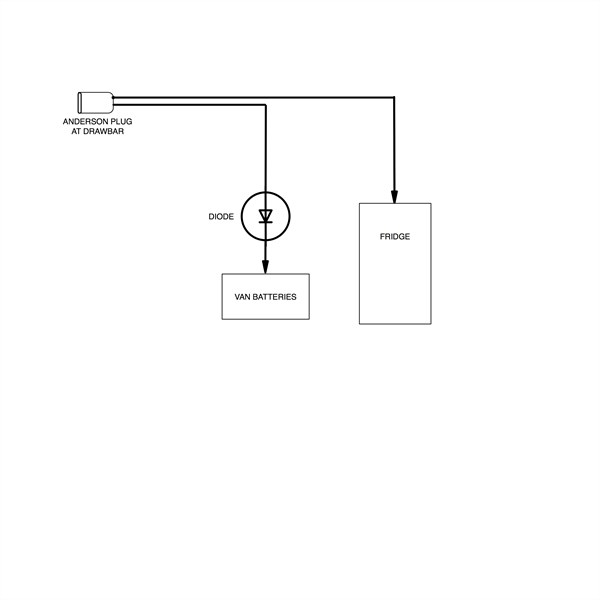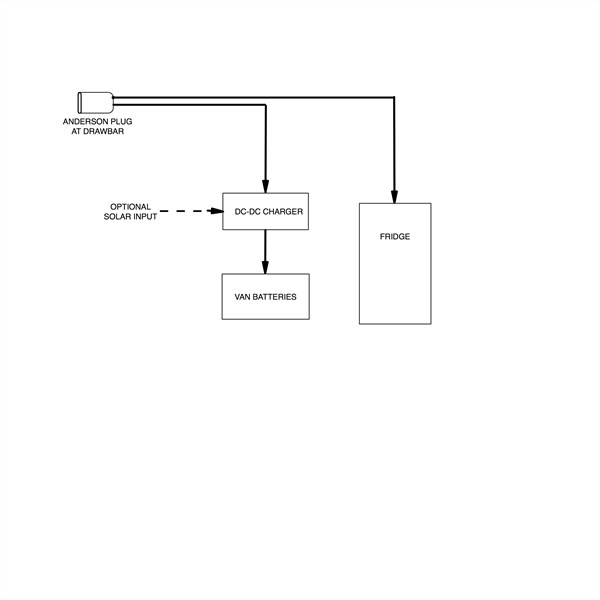3 Way Fridge Wiring
Submitted: Monday, May 20, 2019 at 06:34
ThreadID:
138354
Views:
9244
Replies:
7
FollowUps:
3
This Thread has been Archived
Daniel G3
Hi
I have a 2017 Kokoda Major Extreme van which has a Thetford 164 litre 3 way fridge.
There is an anderson plug at the draw-bar which has 2 actives and 2 negatives crimped together at the plug.
I have been able to trace one of these wires which goes through a 30 amp fuse and connects directly to my 2 x 100 amp/hr batteries.
The other wire is difficult to trace but I think it goes directly to the high current side of the fridge. There is a second wire which operates the display panel on the fridge connected to Low current connection at the back of the fridge.
With anderson plug not connected to my vehicle the fridge will not run ( I have tonged for current at the fridge). I connect the anderson plug to my vehicle which is running and get 15 amps at the fridge and 1 amp from the second wire which runs to my batteries. Disconnect it and fridge stops. How is this possible? I do have some electrical knowledge and cannot understand how this is possible. I want to make sure that my fridge cannot run from my van batteries.
Is there some smarts in the fridge that makes this happen? As far as I know it is not an auto sensing fridge which looks for the best power source.
Reply By: swampy - Monday, May 20, 2019 at 07:46
Monday, May 20, 2019 at 07:46
hi
There maybe a diode in battery wire preventing the fridge drawing current from onboard van batts . Good feature .
The cable in your car needs to be 25mmsq/ 3b&s
25mmsq cable carries 36amps at .4volt drop over 9mtrs
13mmsq cable 18amps at .4 volt drop over 9mtr
without a dc/dc charger charge time = voltdrop eg more V/D longer charge time .
AnswerID:
625619
Reply By: Allan B (Sunshine Coast) - Monday, May 20, 2019 at 10:23
Monday, May 20, 2019 at 10:23
.
Hi Daniel,
As Swampy has said, it is probable that a diode is fitted in the battery feed to prevent output to the fridge. (Block Diagram 1, below) The diode is quite small and may not appear obvious to you.
However, a diode (even Schottky type) will introduce some small voltage loss in your charge voltage and you are already suffering loss in the wiring volt-drop.
An improved scheme is as per Block Diagram 2 where the diode is replaced with a DC-DC charger. This will also prevent feed to the fridge but will overcome volt-drops and provide multi-stage battery charging. Some models of charger have provision for solar input to the batteries without the need for a solar controller.

Block Diagram 1

Block Diagram 2
AnswerID:
625627
Reply By: RMD - Monday, May 20, 2019 at 12:21
Monday, May 20, 2019 at 12:21
If there is no voltage drop in the line to the van batteries from the Anderson plug point, checkable with volt Meyer when not connetced, then the van may have a vsr type device fitted somewhere and it switches the fridge to ON when sufficient voltage is applied.
Also, if running two big van batteries which may be discharged a bit AND 15amp fridge load as
well, besides good sized cabling, I would double the size of the POOR alt to main battery cable. These are small as OE cables and ok for normal use, BUT when charging constant high loads which does happen for lengthy periods, that poor cable acts as a restriction resistance because it runs very bloody hot and IS part of the charge circuit. It runs hot purely because of engine heat alone and not only from amp flow.
I doubled
mine in an earlier vehicle to attain alt voltage to run headlight relays for lights. 55w globes drew less Amps, ran high colour temps and gave more light than 100w globes did before the mod and 1/2 the Amps required. There were other advantages too.
AnswerID:
625629
Reply By: Daniel G3 - Monday, May 20, 2019 at 16:48
Monday, May 20, 2019 at 16:48
Thanks to everyone who has replied. I have a 180 watt solar on the roof of the van so that should take care of charging the caravan batteries so at this stage not interested in a DC to DC charger.
I have 6 b&s cable from alternator to back of vehicle which seems to keep the fridge cold when traveling.
I just wanted to ensure that the fridge cannot draw power from the van batteries as we intend to do a fair bit of
free camping.
I might seriously consider running another 13mm cable in parallel with the current cable
Dan
AnswerID:
625644
Follow Up By: RMD - Monday, May 20, 2019 at 21:35
Monday, May 20, 2019 at 21:35
When at
camp don't you run the fridge on gas? If so, then the fridge will be turned off the 12v Power as the selector switch/knob is selected to gas.
FollowupID:
899315
Follow Up By: swampy - Monday, May 20, 2019 at 22:44
Monday, May 20, 2019 at 22:44
HI
Daniel
Yes we have mentioned cable amperage capacity.
Briefly current consumption
fridge 15amps
batterry charge 3 amps
Current above 3amps will cause voltage drop and charging takes 2-3 times longer minimum.
Yes u have mention cable addition great move .
Suggest if u use a lot of power or just want more ,increase solar would also be recommended .
2x 100Ah = usable 100Ah available
recharge ability 180 watts= 43ah
Obviously u could have more available but need more solar min 160watt
Having 160-200watt per 100-120ah batt will give good recharge performance .
Hope all this helps
FollowupID:
899316
Follow Up By: Daniel G3 - Tuesday, May 21, 2019 at 06:19
Tuesday, May 21, 2019 at 06:19
Hi Swampy
Appreciate the advise. I do have an additional 250 watt portable solar panel which I use on the van and also for charging my second battery in my vehicle. I do not want to get to a situation where I have driven for 6 hours and when I pull over at a
free camp I am way down on caravan battery voltage. I will look for the Diode as this would explain why the fridge is not drawing from the batteries. I like many others do not want my hungry 3 way fridge to draw power from my van batteries.
If using LED lights at night the solar and small current from alternator should easily charge the van batteries.
I need to get out and enjoy the van and do some field testing.
Again thanks to all who have offered advice.
Dan
FollowupID:
899317
Reply By: Batt's - Tuesday, May 21, 2019 at 02:34
Tuesday, May 21, 2019 at 02:34
That should be an easy fix disconnect fridge from van batteries, make sure there is an isolation switch on starter battery.
Not sure why you don't want it running off van batteries it comes in handy reducing the need to have to rush around and get it running on gas as soon as you can after pulling up especially in hot weather. Also if your stopping for short breaks or sight seeing or ducking into the shops say for up to an hour you don't have to muck around opnening and closing the van turning gas bottle on and off switching the fridge to gas lighting it then the reverse when heading off and that could be a couple of times a day or more on some trips. 200ah's should handle that with ease plus you have a small amount of solar feeding it. I use to do it with our van no problems without solar.
Just wondering the 30amp fuse to me seems a bit restrictive to the supply for the van batteries I thought it would blow.
AnswerID:
625656
Reply By: Member - McLaren3030 - Tuesday, May 21, 2019 at 17:03
Tuesday, May 21, 2019 at 17:03
Daniel G3,
Rather than stopping the fridge from running off the van batteries, I would be investigating why the van batteries and not being kept charged from the car whilst driving. This would seam to be the most efficient way to have your system wired. My van fridge when running on 12 volt, runs off the van batteries, and the van batteries are kept charged, either by 240 volt, via the van’s dc/dc battery charger, or by solar mounted on the roof of the van, or by the car via the anderson plug.
Macca.
AnswerID:
625662
Reply By: Member - Jim - Friday, May 24, 2019 at 16:41
Friday, May 24, 2019 at 16:41
Daniel,
I have a Kokoda Salute and when delivered the wiring was:
Anderson Plug to Van Batteries and Van Batteries to the Fridge high current.
The 12v Fridge control was fed from the van batteries and when the van power was isolated at the switch so was the fridge control.
I located the wiring from the Anderson plug at the batteries and connected it through to the fridge high current (bypassing the batteries) and changed the control circuit to it's own switch so that it was not isolated when turned off.
I have no need to charge the batteries from the car, leaving that to the solar panels when towing. If I ever need to do this I will install another feed from the car and a DC-DC charger for this.
It works
well, and the batteries will thank you for taking the fridge off them.
Cheers,
Jim
AnswerID:
625724